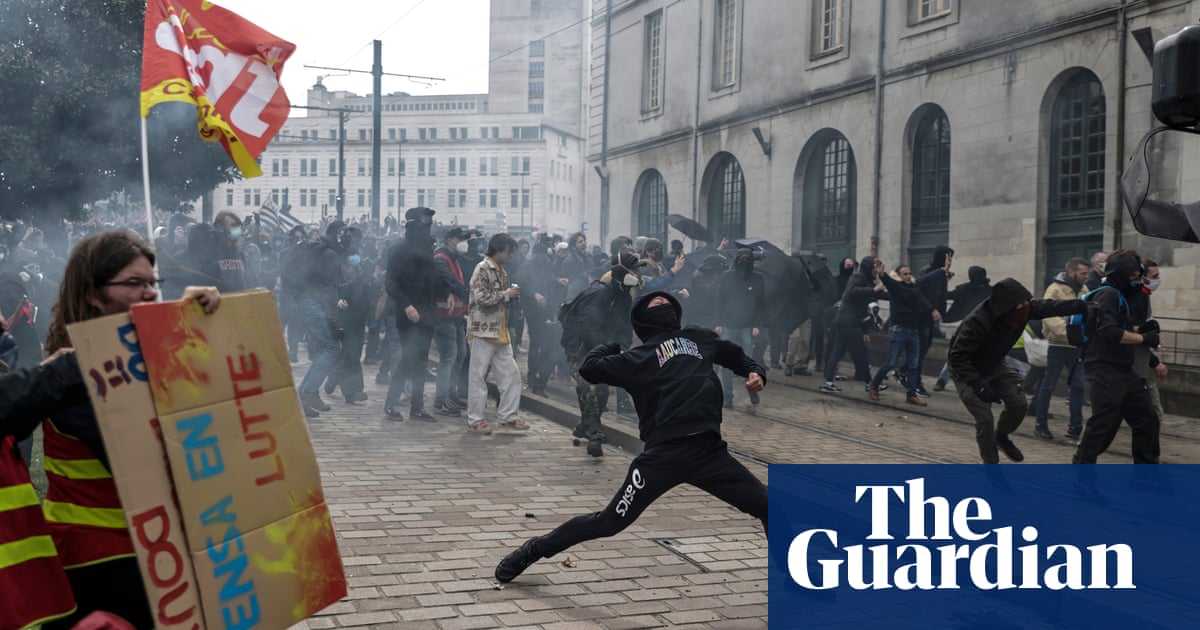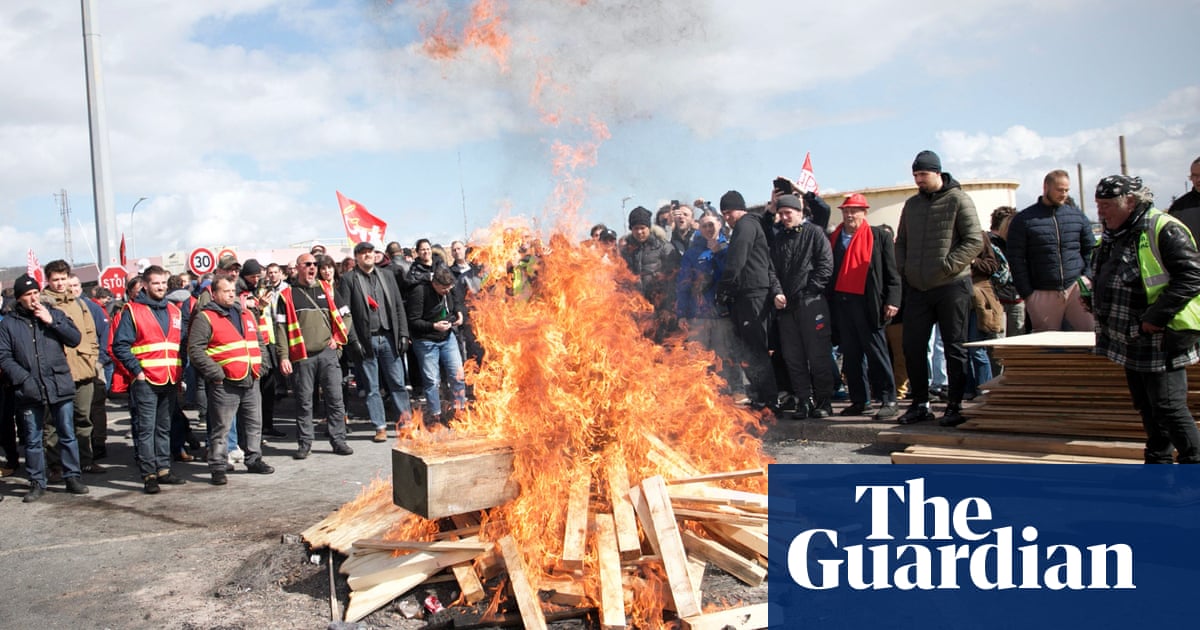
Why are the French so much more militant than the British? Frank Cooper, Middlesbrough
Send new questions to nq@theguardian.com.
Readers reply
All in the music. While the French have rousing, no messing about lyrics in their national anthem: “Aux armes citoyens! Formez vos bataillons!” We’re stuck with: “God save our gracious …” which has all the verve and enthusiasm of a clapped out old bus labouring up Muswell Hill. bricklayersoption
They have far more powerful trade unions. Ours were kneecapped by Thatcher. reetpetit
The reason is quite basic, really: the French had and achieved a revolution 230 years ago replacing all the establishment. We in Britain, under Oliver Cromwell, only scotched the establishment, not killed it and it returned under Charles II. Mike Batchelor
One thing I have noticed more and more after growing up in the UK, then living in the US for more than 40 years, is that England is still semi-feudal. Many of its most cherished institutions – monarchy, landed aristocracy, House of Lords (why for?), deeply ingrained class system, Oxbridge, private schools – are now obsolete elsewhere. These are indicators of a forelock-pulling worldview that persists, certainly in my generation. lorantffy
Well said, although I’m not sure about the semi in semi-feudal! delabole
Where to start? Post-revolutionary, power can be challenged and toppled! I think the French government is a little scared of its citizens (they don’t have subjects). Debat is taught in French state schools from college onwards (11+), young people are expected to have an opinion and express it, at school and elsewhere. Café philos remain popular in most towns and cities. Mainstream French TV will happily host long discussion programmes – they can be as boring as hell, but it’s much better than unchallenged soundbites and rushed discussions. French newspapers reflect a range of political views and actually report news and debates in detail quite different from the mainstream UK press. It’s a cultural thing that is nurtured at many different levels. TheFrugalGourmet
Not all the UK is the same, and that goes for England too. The north-west is distinguished by its history of collective action and radical politics.
First trade union: National Association for the Protection of Labour
First TUC
Peterloo massacre
Co-operative movement
National Society for Women’s Suffrage
Women’s Social and Political Union
Kinder Scout mass trespass
Marx and Engels Mizenhead1
I’m sure you mean England, not Britain. If you’re Irish, Scots or Welsh in particular there’s a good chance you find the premise of the question offensive, or at best comical. There’s always been an English radicalism but that anger was successfully exported for many centuries – there’s a good reason Hollywood plays off the trope of English baddies (typically male). Dorkalicious
Anglo-Saxon industrial modernity is inevitably more individualised/atomised (see Thatcher’s famous remarks about society), whereas the French public still sees itself as belonging to conflicting estates, which social conflict is grounded in. Martel
The British sense of humour means that they laugh at themselves too much and never get angry enough to organise a revolution. downweaselway
It’s that historically the British establishment just has (so far, anyway) a knack for knowing exactly when and just how much of a concession is needed to buy off and placate the masses. For instance, the NHS and a social safety net was just enough to take the wind out of some serious, postwar pitchfork rumblings. In my lifetime it has been (for limited periods, anyway) lower taxes than the country could really afford and virtually giving away social housing in the 80s. The next one looks likely to be some kind universal childcare giveaway; as ever – just enough to dampen the fuse on major unrest over hardship. Just. HaveYouFedTheFish
Perhaps the question should be: “Why are the English so passive?” Why are they so prepared to quietly accept the dismantling of their rights and democracy by some very rich politicians? That’s the question most Europeans would ask. DublinOpinion
“What do we want?” “Gradual change!” “When do we want it?” “In due course, if it’s not too much trouble, sorry.” FarmyardManure
Education, innit? The French are taught to think analytically even in school with philosophy a valued mainstream subject. The French have the elite Grandes Écoles above our university level entered only by competition. Our so-called “elite” still cling to the Woolworths superficial pick’n’mix Poundland PPE. nordlys15
The weather is generally better for more of the year over more of the country. It’s harder to get on the street and demonstrate if it is damp and dismal. Fromthesticks
A revolutionary tradition. Article 35 of the French constitution of 1793 said: “When the government violates the rights of the people, insurrection is the most sacred of rights and the most indispensable of duties for the people and for each portion of the people.” Nothing remotely like this has ever appeared in British law. EssoBlue
The French are more militant because they believe in the social contract between le peuple and the government which is a trust to always do the best for the population. A change, or reduction, in these is seen as a violation of that contract (liberté, égalité, fraternité) and trust and a valid reason to revolt. In contrast, the British behave as if any favours dribbled down to them are noblesse oblige of the ruling classes and seem only to be able to sigh and doff caps. mjh20
They are spoilt children with a huge sense of entitlement, that’s why. All the other major nations in Europe are mature and realistic enough to see that a higher pension age is inevitable, given increased life expectancy. But not the French. I don’t think mob rule is anything to be proud of. And the comparison isn’t just with the British, it’s with everyone. You don’t see this kind of thing anywhere else in Europe, or indeed in other G20 nations. maplegirl
To paraphrase the late Victoria Wood, the British don’t have revolutions. They write to Points of View. djc128
They are citizens. We are subjects. Bluestrawberry
My theory: countries with higher rates of antidepressant use have lower rates of protest. hillandvalley
Having spent half of my life in the UK and half in France, I’m not sure that the British are so much less militant (poll tax riots, Greenham Common, Extinction Rebellion, Newbury etc). But French militancy does seem to have better results. The French Fifth Republic arguably gives too much power to the president, especially since Jacques Chirac realigned presidential and parliamentary elections. Prior to that things were less stable and governments seemed very wary of protest movements (memories of May ’68 too, no doubt). I used to say that 15 people marching to Place de la Bastille were enough to produce a U-turn!
Emmanuel Macron’s party did win both elections for his first term, but failed to repeat the exploit for his second, a fact that doesn’t seem to have fully sunk in yet for him. His failure to adequately negotiate his proposed retirement reforms and build a (temporary at least) coalition led to the inflammatory use of the infamous Article 49.3 of the French constitution allowing laws to be passed without parliament getting to vote on them, and he further fanned the flames by claiming that the “crowd” is not the “people” and only he has democratic legitimacy. The result? Turnout at demonstrations tripled! Christopher Roberts
The French word militant is not only descriptive but personifies someone who is politically engagé. Taking to the streets in protest is a default action embedded in the collective French DNA, originating in 1789 and expressed in the words of the Marseillaise. The term citoyen (citizen) has a very real and vital meaning for the French … it implies both responsibilities and rights. The British are “subjects” in the realm of the UK and as such not given to demanding citizens’ rights. On the contrary, the right to protest in Britain is under constant threat. The British collective DNA can be generally characterised as having the characteristics of moderation, amenability and, some would say, even docility. Live and let live, as long as the social order (with all its inequalities) is maintained. These characteristics render British protesters more restrained and more peaceful than their French counterparts. These, necessarily, broad generalisations stem from centuries of divergent national histories and respective traditions and constitutional instruments (or lack thereof). Julian Heddy












